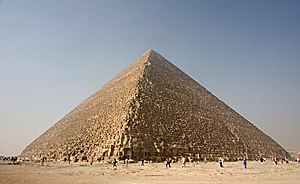
Pyramidology (or pyramidism)[1] refers to various religious or pseudoscientific speculations regarding pyramids, most often the Giza pyramid complex and the Great Pyramid of Giza in Egypt.[2][3] Some "pyramidologists" also concern themselves with the monumental structures of pre-Columbian America (such as Teotihuacan, the Mesoamerican Maya civilization, and the Inca of the South American Andes), and the temples of Southeast Asia.
Some pyramidologists claim that the Great Pyramid of Giza has encoded within it predictions for the Exodus of the Hebrews from Egypt,[4] the crucifixion of Jesus,[4] the start of World War I,[5][6] the founding of modern-day Israel in 1948, and future events including the beginning of Armageddon; this was discovered by using what they call "pyramid inches" to calculate the passage of time where one British inch equals one solar year.
Pyramidology reached its peak by the early 1980s.[citation needed] Interest revived in 1992 and 1993 when Rudolf Gantenbrink sent remote-controlled robots up from the Queen's Chamber.
- ^ Beekman, Scott (31 October 2006). "Pelley, William Dudley". American National Biography (online ed.). New York: Oxford University Press. doi:10.1093/anb/9780198606697.article.1501310. (subscription required)
- ^ Allison B. Kaufman; James C. Kaufman (26 January 2018). Pseudoscience: The Conspiracy Against Science. MIT Press. pp. 458–. ISBN 978-0-262-34482-1.
- ^ Martin Gardner, Fads and Fallacies in the Name of Science, Dover, 1957; a reprint of In the Name of Science, G. P. Putnam's Sons, 1952.
- ^ a b Capt, E. Raymond The Great Pyramid Decoded Artisan Publishers (June 1978) ISBN 978-0-934666-01-5 pp. 76–78
- ^ Davidson, D.; H.W. Badger Great Pyramid & Talks on the Great Pyramid 1881 Kessinger Publishing Co (28 April 2003) ISBN 978-0-7661-5016-4 p.19
- ^ Collier, Robert Gordon Something to Hope For 1942 Kessinger Publishing Co (15 Oct 2004) ISBN 978-1-4179-7870-0 p.17